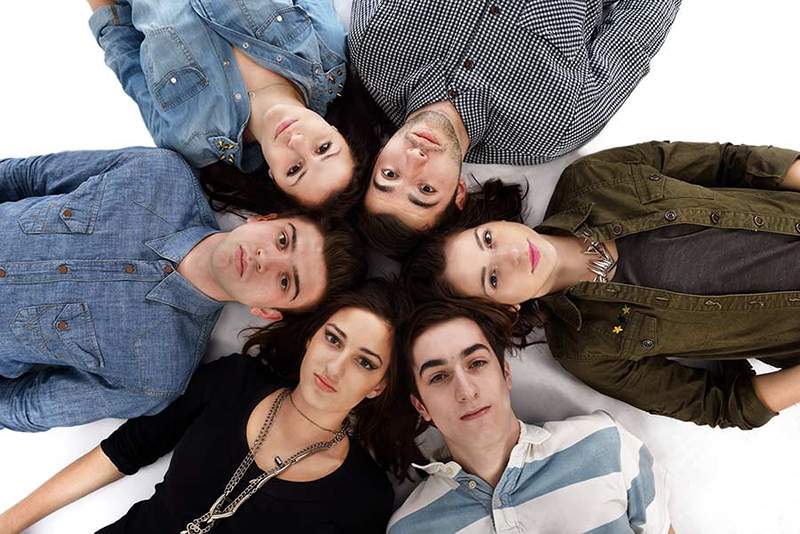Friends are like family the genetic similarities between friends

- 4175
- 868
- Josh Runolfsson II
Content
Toggle- Why do we have so much affinity with friends?
- Our friends, distant cousins ..
- Friends with benefits
- We evolve with a little help from our friends
Why do we have so much affinity with friends?
Many seem to us that Sometimes we connect more with friends than with family itself, that we have more things in common with them. And maybe we have some reason.
A study by the University of California in San Diego and the University of Yale considers that the friends, although they are not biologically related like our family,
James Fowler, co -author of this study says "we find that, as a rule, our friends are genetically similar to us. We have more common DNA with people we choose as friends, of what we have with strangers in the same population ”.
The researchers studied at 1.932 subjects and compared their genomes with the genomes of their friends, then compared their genomes again with those of people who did not know. Thus, the only thing that differentiated the samples to study was their social relationship.
All subjects, whether they were friends as if not, were extracted from the same population. The researchers also controlled their ancestry (to avoid any family coincidence), through the use of the most advanced techniques available today. The result was that The genetic similarities observed went beyond what would be expected to find among the people of the same population. As Fowler concluded, these results are part of an "ancestors network".
Our friends, distant cousins ..
So, how similar are friends with each other? On average, Fowler and Christakis found that friends are "related" as if it were distant cousins or As if they shared their tatara-tatarabuelos. That translates into about 1 percent of our genes.
"One percent may not seem much to the common person," said Christakis, "but for geneticists it is a significant number. And the extraordinary: most people don't even know that their friend is like their cousin fourth! However, we are somehow, among a myriad of possibilities, and that is that we apparently select our friends from the population to which our relatives seem ”.
In the study, Fowler and Christakis also developed what they call a "Friendship score", That it can be used to predict who are going to be friends, more or less with the same level of trust that scientists currently have to predict for example (on genetic basis) if a person has the possibility of suffering from obesity or schizophrenia.
 Wild Man syndrome, what is it
Wild Man syndrome, what is it Friends with benefits
Shared attributes between friends or "Functional kinship" can confer a series of evolutionary advantages. Apparently some features only work if your friend also has them, according to Fowler: "The first hominid who realized that he needed to speak, needed a friend to listen to him. This capacity is useless if there is no one to share it. These types of features in people are a kind of social network effect ”.
Beyond the similarities throughout the genome, Fowler and Christakis looked in the study all the set of genes. And they found that friends are more similar in genes that mainly affect the meaning of smell. The opposite occurs for genes that control immunity. That is to say, Friends are relatively more different in their genetic protection against various diseases.
There is a fairly simple evolutionary advantage in all this, and it is that have connection with other people who are capable of supporting different pathogens, reduces interpersonal diffusion. But how do we select people for this benefit of immunity? The mechanism is not yet clear.
As for the olfactory sense, Fowler said that Our smell attracts us to similar environments. It is not difficult to imagine that people who like the smell of coffee, for example, hang out in cafes more and find it and become friends with each other. However, researchers suspect that there is something else.
They also point out that there are most likely several mechanisms, which operate in parallel and lead us to choose similar genetically similar friends.
We evolve with a little help from our friends
Perhaps the most intriguing result in the study is that The genes that are more similar among friends seem to be evolving more quickly than other genes. Fowler and Christakis say this can help explain why human evolution seems to have accelerated in the last 30.000 years, and suggest that the social environment itself is an evolutionary force.
"The document also provides support for the vision of human beings as' metagenomic," said Christakis, "not only with respect to microbes within us, but also to the people around us. It seems that our health depends not only on our own genetic constitutions, but also on the genetic constitutions of our friends ”.
- « The self -revealing what are they and what they are for?
- Speech analysis can predict the risk of psychosis »

